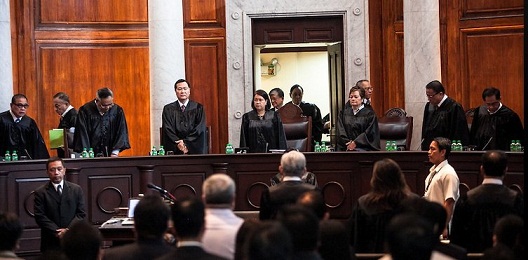WE did not fully get what we asked Supreme Court regarding the Republic Act 10175 otherwise known as the Cybercrime Prevention Act of 2012 which was to declare the whole of it as unconstitutional primarily because of its libel provisions. But we can live with the Supreme Court decision released yesterday.
We still have to fully analyze the SC decision which upheld the constitutionality of the controversial law but struck down the most odious “take down”provision which empowered the Department of Justice) to restrict or block access to any online post which it deemed violating the law without any court order.
The court also said only original authors of libelous material are covered by the cybercrime law, and not those who merely received or reacted to it. So those who “liked” and shared a libelous online item won’t be punished. Good luck to whoever is tasked to trace the original author after a post is shared and reposted thousands of times.
But what we are not happy about the SC decision is that, not only did it uphold the constitutionality of the libel law as a criminal offense but also sustained the increase in penalty.
R.A 10175 increased the penalty for computer-related libel twelvefold. From a minimum punishment of six months imprisonment under the Revised Penal Code, the Cybercrime Prevention Law increased it to six years. The maximum punishment was doubled from six to twelve years in prison.
 VERA Files, the group I’m affiliated with, is one of the petitioners against the Cybercrime Prevention Act of 2012 with Alexander Adonis, the Davao correspondent, who was convicted and imprisoned for libel, and other journalists. With Harry Roque, our lawyer, we asked the High Court to declare the law illegal because it violates basic human rights (freedom of expression) and the Constitution (freedom of expression provision).
VERA Files, the group I’m affiliated with, is one of the petitioners against the Cybercrime Prevention Act of 2012 with Alexander Adonis, the Davao correspondent, who was convicted and imprisoned for libel, and other journalists. With Harry Roque, our lawyer, we asked the High Court to declare the law illegal because it violates basic human rights (freedom of expression) and the Constitution (freedom of expression provision).
In a statement issued from Bangkok, where he is attending a forum on freedom of expression, Roque said “Centerlaw and our client, Alexander Adonis welcome the other provisions of the Act such as the Take Down clause and the decision to strike down the real time gathering of information. This is indeed a major victory for privacy and the right of the people.”
Roque said, “The high court should not abdicate its duty to protect freedom of expression. No less than the U.N. Human Rights Committee has already declared that Philippine Criminal Libel Law is contrary to Freedom of Expression. The Court’s decision failing to declare libel as unconstitutional is therefore contrary to Human Rights Law to be secure in their communication. “
Roque said the fight is not over: “We will continue the fight to nullify criminal libel. Cyber libel infringes on free speech.”
DOJ Assistant Secretary Geronimo L. Sy, head of the Office of Cybercrime, said R.A 10175 will take effect minus the provision struck down by the Supreme Court.
“Meanwhile we will endorse to Congress an upgraded and better version of the Cybercrime law,” Sy said adding that they have already prepared Version Two of the Cybercrime Prevention Act of 2012. They will now be crafting the implementing rules.
Statement of the National Union of Journalists of the Philippines:
“A half-inch forward but a century backward.
“This best describes the Supreme Court’s decision on the petitions to declare the Cybercrime Prevention Act unconstitutional.
“For while the high court rightly declared a number of provisions of the statute unconstitutional, it otherwise upheld the law and, worse, online libel, thus adding yet another element — ironically the very frontier we all believed would be most immune to attempts to suppress free expression — to an offense that former colonizers had, a hundred years ago, declared criminal in nature to stifle dissent, and which succeeding governments have conveniently retained in our Revised Penal Code for the very same reason and as a convenient tool for the corrupt and the inept in power to harass and muzzle those with the temerity to bring their venalities to light.
“By extending the reach of the antediluvian libel law into cyberspace, the Supreme Court has suddenly made a once infinite venue for expression into an arena of fear, a hunting ground for the petty and vindictive, the criminal and autocratic.
“We can only hope that the Supreme Court will not remain blind to this when appeals to the ruling are filed.
“But if it does, then there can only be one response lest we be forced to surrender all our other rights — resistance.”

